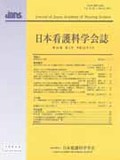Japanese
English
- 販売していません
- Abstract 文献概要
- 参考文献 Reference
要旨
目的:高校生の登校回避感情の関連要因を明らかにし,不登校を予防するためのより効果的な早期支援の可能性を検討する.
方法:A県公立高等学校1年生3,985人を対象に自記式質問紙調査を実施した.登校回避感情測定尺度(学校への反発感傾向,友人関係における孤立感傾向,登校嫌悪感傾向)を用い,下位尺度別に属性,生活環境,生活習慣,身体的心理的社会的要因との関連を分析した.
結果:学校への反発感傾向と有意な関連がみられた主な要因は,喫煙経験・対人恐怖心性・担任からのサポート・学業場面における不適応感,友人関係における孤立感傾向は対人恐怖心性・学校内の友人からのサポート,登校嫌悪感傾向は対人恐怖心性・不定愁訴・学業場面における不適応感・学校内の友人からのサポートであった.
結論:対人恐怖心性や不定愁訴を持ち,学業や将来への意識が低い生徒が学校への反発的な感情を持ち,自分から集団に入れず,学校内に友人がいないことが孤立感を強めていると推測された.対人恐怖心性と不定愁訴の訴えは,不登校の潜在群を捉えるための重要な指標であり,養護教諭による適切な支援の重要性とコンサルテーションシステム構築の必要性が示唆された.
Abstract
Aim: The aim of this study was to identify the factors that are involved in the feelings of school avoidance of high school students in order to develop an effective early support method for preventing refusal to attend school.
Methods: A total of 3,985 10th grade students from all the public senior high schools in “A” Prefecture in Japan agreed to participate in the study. They were asked to complete the Feelings of School Avoidance(FSA) Scale(“bad feelings toward school,” “friendlessness” and “aversion to attending school”), as well as provide information relating to their demographic details, living environment, lifestyle, and physical, psychological, and social factors.
Results: The “bad feelings toward school” subscale of the FSA Scale was significantly correlated with experience of smoking, anthropophobic tendency, the support from homeroom teacher and feelings of maladjustment in the study setting. The “friendlessness” subscale of the FSA Scale was significantly correlated with anthropophobic tendency and the support from school friends. The “aversion to attending school” subscale of the FSA Scale was significantly correlated with anthropophobic tendency, unidentified complaints, feelings of maladjustment in the study setting and the support from school friends.
Conclusions: It was supposed that the students who had anthropophobic tendency, unidentified complaints and who were not future oriented had repulsive feelings toward school. In addition, it was supposed that not being able to become part of the group by themselves and not having any friends in school intensified the sense of friendlessness. These findings suggested that anthropophobic tendency and unidentified complaints can be an important index in identifying a latent group of students who would avoid school attendance. The findings also suggested the importance of appropriate support from the yogo teacher and the need to develop a consultation system.
Copyright © 2013, Japan Academy of Nursing Science. All rights reserved.


